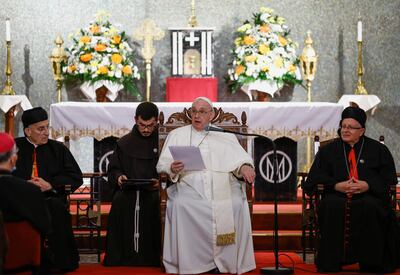Two Cameroonian asylum-seekers who have been stranded in the UN-patrolled buffer zone for the past six months are hoping the pope’s visit to Cyprus will finally lead to them being granted a safe haven.
Pope Francis began his visit two-day visit to the island today to lend his support to the divided island on the front line of a new migratory route for people fleeing their countries for Europe.
Young children waving flags of Cyprus and the Vatican welcomed Francis at Larnaca airport, and three young girls in Cypriot traditional dress gave him bouquets of flowers. The pope visited Our Lady of Graces Maronite church in the first stop of his Apostolic journey on the island.
On Friday he is scheduled to perform mass at an open-air stadium and later hold an "ecumenical prayer" with migrants at a Roman Catholic church in the divided capital.
He will carry on to Greece for a further two days, including a day trip to the Greek island of Lesbos, at present home to many foreign migrants.
"It will be a beautiful trip but we will touch some wounds. I hope that we all will be able to gather up the messages given to us," Pope Francis said on the flight to Cyprus.
In keeping with his papacy’s keystone commitment to defend migrants and refugees, the pope has arranged to have 50 migrants relocated to Italy after his trip.
After spending half this year homeless in the middle of the divided island’s Green Line and without access to due asylum process, two young Cameroonian students are holding out hope that they will be among the pope’s chosen flock.
“If I have the opportunity to go back with him [Pope Francis] then I would be so much grateful. If he can do this for me then I would so much love him. I will be happy if I have that opportunity,” said Grace Enjei.

Compatriot Daniel Ejuba said he too had faith that the pope would select them.
“I know the pope, I think God believes in me because I am a Catholic Christian. So I believe the pope heard our case, so that means our case will be solved, and that’s the belief I have,” he said.
Ms Enjei and Mr Ejuba flew into Turkish-occupied northern Cyprus from their native Cameroon in early spring. They later, on advice from smugglers, jumped over the barbed wire dividing the island’s capital of Nicosia in an attempt to enter the EU member state and claim asylum.
In May, the pair leapt from the breakaway Turkish Cypriot republic thinking they had landed in the internationally recognised Greek south, but found themselves in the United Nations-manned buffer zone between the two sides instead.

After approaching a UN patrol unit, they were directed to the nearest Greek Cypriot checkpoint but were refused entry and have been living in a tent in the courtyard of a community centre in the the 180 kilometre demilitarised zone ever since.
The UN refugee agency, UNHCR, which with the Home for Co-operation has been providing the two with food and sanitation facilities, told The National that they had been intervening on their behalf with Cypriot authorities to have their asylum claims heard.
“According to international law they should be allowed access to cross into Cyprus and submit their claims and be processed, however, that has not been possible and they have been living in a very precarious situation,” said the UN refugee agency’s spokeswoman, Emilia Strovolidou.

The agency has been providing humanitarian assistance, including psychological support.
“This situation has had a toll on their mental health, they’ve been in limbo for six months now and they can’t cross back into the North because they would be prosecuted for illegal entry and would be subject to deportation,” Ms Strovolidou told The National.
A civil war has been raging in the Anglophone region of Cameroon for the past five years with armed separatists fighting government forces, resulting in the displacement of more than 700,000 civilians.
Cyprus is “obliged under international, EU and national law” to process asylum requests “regardless of their mode of arrival” and allow “unimpeded access” to dignified conditions in reception centres, Ms Strovolidou said.
But the Mediterranean island has been taking an increasingly hard-line stance against immigration. Last month the Cypriot government said it was submitting a request to the European Commission to suspend applications for asylum for all those who arrive in the country illegally.
Amid worsening political relations between the north and south of the island, the Cypriot Republic blamed Turkey for the influx, accusing the breakaway Turkish Republic of Northern Cyprus of purposefully allowing – or turning a blind eye to – the activity along its border.
Meanwhile, Ms Enjei and Mr Ejuba are stranded by the island’s long-standing conflict, unable to turn back nor move forward. Having already endured a scorching summer outdoors, an approaching winter will undoubtedly worsen their living conditions. Without being allowed access to legal asylum mechanisms their hopes hinge on a papal salvation.






















